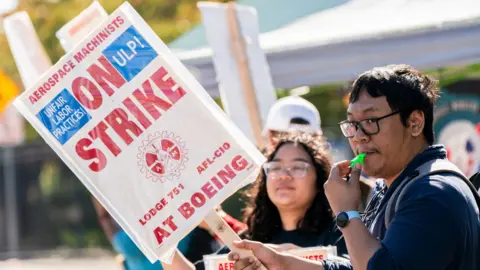Boeing withdraws 30% pay rise offer to striking staff
 Getty Images
Getty ImagesBoeing says it has withdrawn its pay rise offer to striking workers after negotiations with union representatives reached a stalemate.
The aviation giant accused the union of not giving its proposals serious consideration.
The International Association of Machinists and Aerospace Workers union (IAM) said Boeing was "hell-bent on standing on the non-negotiated offer" which it says was rejected by its members.
Last month, Boeing announced what it called its "best and final" offer to workers, which proposed a 30% rise over four years - lower than the 40% being demanded by the union.
"The union made non-negotiable demands far in excess of what can be accepted if we are to remain competitive as a business," Boeing Commercial Airplanes President Stephanie Pope said in a letter sent to employees.
"Given that position, further negotiations do not make sense at this point and our offer has been withdrawn."
But union representatives said Boeing was not willing to negotiate the terms of the plane maker's latest offer.
Negotiators "attempted to address multiple priorities that could have led to an offer we could bring to a vote, but the company wasn’t willing to move in our direction," IAM said in a statement.
More than 30,000 Boeing workers in the northwest of the US went on strike last month after overwhelmingly rejecting a tentative deal that included a 25% pay rise.
In response to the walkout that has shut down production of some of its planes, the company has suspended the jobs of tens of thousands of staff .
Boeing has said US-based executives, managers and staff would be asked to take one week of furlough every four weeks as long as the strike lasts.
The firm has said the impact of the strike will depend on its duration, but analysts say an extended stoppage could cost the firm and its suppliers billions of dollars.
The last strike at Boeing in 2008 lasted about eight weeks.
The stand-off adds to the challenges faced by Boeing's new chief executive Kelly Ortberg, who was appointed in August with a mission to turn the business around.
Before the walkout, the company had already been dealing with historic losses, while production had slowed as the firm responded to concerns about the quality of its manufacturing.
